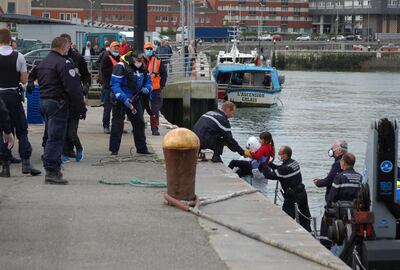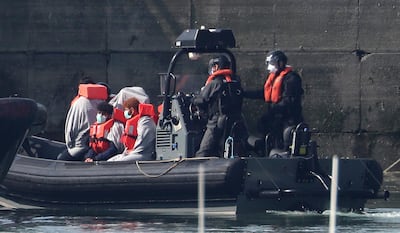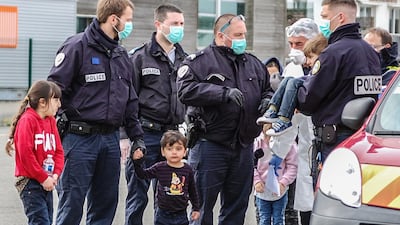From that famous English landmark, the white cliffs of Dover, on most days you can see a visual echo on the other side of the channel, the white cliffs of France. The French coast is so near that when I walk along the cliffs my mobile phone switches from a British telecoms system to a French one.
The channel is one of the world’s busiest waterways with enormous containerships, oil tankers and sometimes a warship heading to or from northern European ports. The cross-Channel ferries take less than two hours to travel from Dover to Calais. Most days there is also another familiar vessel offshore, a British Border Force cutter.
Despite the lockdown, despite the travel restrictions, despite the law, almost every day small boats take advantage of the calm weather to try their luck and cross from France to England illegally.
Some 1500 illegal migrants have reached Kent this year, 600 during May alone. They travel packed on barely seaworthy craft provided for up to €3000 (Dh12,000) each person by ruthless gangs of people-smugglers.
Last week one dinghy, which could comfortably fit perhaps four people, arrived with 13 on board, leaving the criminal gangs with a tidy profit of tens of thousands of euros. When I talk with Border Force officers they admit they are often shocked and upset by what they see. Even in good weather, the sea is cold and migrants often suffer from hypothermia. One officer told me of a rescued mother in shock from the cold cradling her young child who was almost dead as a result of the chill from drifting in an open dinghy for hours.
The migrants are sometimes fleeing war zones, from Syria or Afghanistan. But many are economic migrants looking for a better life, including Iranians escaping their repressive government and the economic basket case their country has become.

The former head of UK Border Force Tony Smith told British MPs that he cannot see an “immediate end” to the human trafficking and that the government needs to have a “very serious look” at its capabilities. The Border Force has been under-resourced for years. At one port in the south of England they were so short-staffed that when checking one suspect lorry for human cargo, other stowaways in other lorries made their escape knowing they could not all be pursued.
Inevitably this has become a political gift for right-wing anti-immigration activists like Brexit Party leader Nigel Farage. He appeared to flout coronavirus lockdown rules by travelling to the coast for a publicity stunt. He made a film and wrote a newspaper column about what he calls “a scandal that has been known about for a long time among seaside communities but which, until now, has never been filmed or broadcast to the British public. I refer to the arrival of illegal immigrants in British waters with the active participation of the French Navy.”
Blaming the French has been an English pastime for centuries, but Mr Farage is simply wrong to lay blame on French sailors shadowing the boats. What does he want? The French navy to make dangerous arrests at sea in the middle of shipping lanes? Cannon fire to sink the inflatables?
Beyond political grandstanding the real issue is how migrants manage to travel thousands of miles and find people-smugglers in France, while the authorities cannot track down more of the gangs behind this trade and jail them. What’s needed is not picking a fight with our French neighbours. It is working with them and the whole EU to do more.

Somehow large numbers of migrants find their way to Calais by travelling through several European countries. Greece and Italy are in the front line and need even more assistance than they currently receive – help, not blame. But Britain will always be the destination of choice for many, because they speak English and already have relatives here, and also because the British economy has often been able to find work for willing hands. Right now there is a serious shortage of farmworkers.
Even if miraculously Afghanistan and Syria find peace, people will always move to find a better life. Climate change, the loss of productive farmland and water shortages mean millions will think of seeking their fortunes in Europe. Shakespeare wrote of the sea as England’s moat and defensive wall protecting “this sceptr’d isle” from invasion. It’s wonderful poetry but poor geography.
The sea for thousands of years has mostly been a means of communication. Iranians, Syrians and Afghans come in a long line of those who migrated and often enriched Britain including German tribes, Norman conquerors, Jewish and Huguenot religious refugees, and many others. If you walk northwards from the cliffs at Dover eventually you arrive at a pebble beach at Walmer where an insignificant concrete monument marks the arrival of another foreigner. Julius Caesar landed his Roman legions in Kent 2000 years ago. St Augustine brought Christianity here in 597. Migration to England has never been easy, but it has brought with it many good things.
Gavin Esler is a journalist, author and presenter


